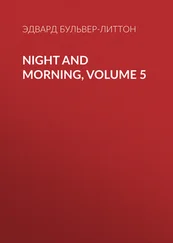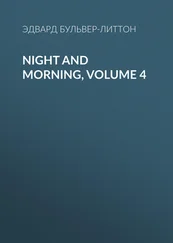Эдвард Бульвер-Литтон - Night and Morning, Complete
Здесь есть возможность читать онлайн «Эдвард Бульвер-Литтон - Night and Morning, Complete» — ознакомительный отрывок электронной книги совершенно бесплатно, а после прочтения отрывка купить полную версию. В некоторых случаях можно слушать аудио, скачать через торрент в формате fb2 и присутствует краткое содержание. Жанр: foreign_prose, literature_19, Европейская старинная литература, foreign_antique, на английском языке. Описание произведения, (предисловие) а так же отзывы посетителей доступны на портале библиотеки ЛибКат.
- Название:Night and Morning, Complete
- Автор:
- Жанр:
- Год:неизвестен
- ISBN:нет данных
- Рейтинг книги:3 / 5. Голосов: 1
-
Избранное:Добавить в избранное
- Отзывы:
-
Ваша оценка:
- 60
- 1
- 2
- 3
- 4
- 5
Night and Morning, Complete: краткое содержание, описание и аннотация
Предлагаем к чтению аннотацию, описание, краткое содержание или предисловие (зависит от того, что написал сам автор книги «Night and Morning, Complete»). Если вы не нашли необходимую информацию о книге — напишите в комментариях, мы постараемся отыскать её.
Night and Morning, Complete — читать онлайн ознакомительный отрывок
Ниже представлен текст книги, разбитый по страницам. Система сохранения места последней прочитанной страницы, позволяет с удобством читать онлайн бесплатно книгу «Night and Morning, Complete», без необходимости каждый раз заново искать на чём Вы остановились. Поставьте закладку, и сможете в любой момент перейти на страницу, на которой закончили чтение.
Интервал:
Закладка:
“Now, Mrs. P., my second cup, and give Mr. Morton his dish of tea. Must be tired, sir—hot day. Jemima, ring—no, go to the stairs and call out ‘more buttered toast.’ That’s the shorter way—promptitude is my rule in life, Mr. Morton. Pray-hum, hum—have you ever, by chance, studied the biography of the great Napoleon Buonaparte?”
Mr. Plimmins gulped down his tea, and kicked Philip under the table. Philip looked fiercely at the foreman, and replied, sullenly, “No, sir.”
“That’s a pity. Napoleon Buonaparte was a very great man,—very! You have seen his cast?—there it is, on the dumb waiter! Look at it! see a likeness, eh?”
“Likeness, sir? I never saw Napoleon Buonaparte.”
“Never saw him! No, just look round the room. Who does that bust put you in mind of? who does it resemble?”
Here Mr. Plaskwith rose, and placed himself in an attitude; his hand in his waistcoat, and his face pensively inclined towards the tea-table. “Now fancy me at St. Helena; this table is the ocean. Now, then, who is that cast like, Mr. Philip Morton?”
“I suppose, sir, it is like you!”
“Ah, that it is! strikes every one! Does it not, Mrs. P., does it not? And when you have known me longer, you will find a moral similitude—a moral, sir! Straightforward—short—to the point—bold—determined!”
“Bless me, Mr. P.!” said Mrs. Plaskwith, very querulously, “do make haste with your tea; the young gentleman, I suppose, wants to go home, and the coach passes in a quarter of an hour.”
“Have you seen Kean in Richard the Third, Mr. Morton?” asked Mr. Plimmins.
“I have never seen a play.”
“Never seen a play! How very odd!”
“Not at all odd, Mr. Plimmins,” said the stationer. “Mr. Morton has known troubles—so hand him the hot toast.”
Silent and morose, but rather disdainful than sad, Philip listened to the babble round him, and observed the ungenial characters with which he was to associate. He cared not to please (that, alas! had never been especially his study); it was enough for him if he could see, stretching to his mind’s eye beyond the walls of that dull room, the long vistas into fairer fortune. At sixteen, what sorrow can freeze the Hope, or what prophetic fear whisper, “Fool!” to the Ambition? He would bear back into ease and prosperity, if not into affluence and station, the dear ones left at home. From the eminence of five shillings a week, he looked over the Promised Land.
At length, Mr. Plaskwith, pulling out his watch, said, “Just in time to catch the coach; make your bow and be off—smart’s the word!” Philip rose, took up his hat, made a stiff bow that included the whole group, and vanished with his host.
Mrs. Plaskwith breathed more easily when he was gone. “I never seed a more odd, fierce, ill-bred-looking young man! I declare I am quite afraid of him. What an eye he has!”
“Uncommonly dark; what I may say gipsy-like,” said Mr. Plimmins.
“He! he! You always do say such good things, Plimmins. Gipsy-like, he! he! So he is! I wonder if he can tell fortunes?”
“He’ll be long before he has a fortune of his own to tell. Ha! ha!” said Plimmins.
“He! he! how very good! you are so pleasant, Plimmins.”
While these strictures on his appearance were still going on, Philip had already ascended the roof of the coach; and, waving his hand, with the condescension of old times, to his future master, was carried away by the “Express” in a whirlwind of dust.
“A very warm evening, sir,” said a passenger seated at his right; puffing, while he spoke, from a short German pipe, a volume of smoke in Philip’s face.
“Very warm. Be so good as to smoke into the face of the gentleman on the other side of you,” returned Philip, petulantly.
“Ho, ho!” replied the passenger, with a loud, powerful laugh—the laugh of a strong man. “You don’t take to the pipe yet; you will by and by, when you have known the cares and anxieties that I have gone through. A pipe!—it is a great soother!—a pleasant comforter! Blue devils fly before its honest breath! It ripens the brain—it opens the heart; and the man who smokes thinks like a sage and acts like a Samaritan!”
Roused from his reverie by this quaint and unexpected declamation, Philip turned his quick glance at his neighbour. He saw a man of great bulk and immense physical power—broad-shouldered—deep-chested—not corpulent, but taking the same girth from bone and muscle that a corpulent man does from flesh. He wore a blue coat—frogged, braided, and buttoned to the throat. A broad-brimmed straw hat, set on one side, gave a jaunty appearance to a countenance which, notwithstanding its jovial complexion and smiling mouth, had, in repose, a bold and decided character. It was a face well suited to the frame, inasmuch as it betokened a mind capable of wielding and mastering the brute physical force of body;—light eyes of piercing intelligence; rough, but resolute and striking features, and a jaw of iron. There was thought, there was power, there was passion in the shaggy brow, the deep-ploughed lines, the dilated, nostril and the restless play of the lips. Philip looked hard and grave, and the man returned his look.
“What do you think of me, young gentleman?” asked the passenger, as he replaced the pipe in his mouth. “I am a fine-looking man, am I not?”
“You seem a strange one.”
“Strange!—Ay, I puzzle you, as I have done, and shall do, many. You cannot read me as easily as I can read you. Come, shall I guess at your character and circumstances? You are a gentleman, or something like it, by birth;—that the tone of your voice tells me. You are poor, devilish poor;—that the hole in your coat assures me. You are proud, fiery, discontented, and unhappy;—all that I see in your face. It was because I saw those signs that I spoke to you. I volunteer no acquaintance with the happy.”
“I dare say not; for if you know all the unhappy you must have a sufficiently large acquaintance,” returned Philip.
“Your wit is beyond your years! What is your calling, if the question does not offend you?”
“I have none as yet,” said Philip, with a slight sigh, and a deep blush.
“More’s the pity!” grunted the smoker, with a long emphatic nasal intonation. “I should have judged that you were a raw recruit in the camp of the enemy.”
“Enemy! I don’t understand you.”
“In other words, a plant growing out of a lawyer’s desk. I will explain. There is one class of spiders, industrious, hard-working octopedes, who, out of the sweat of their brains (I take it, by the by, that a spider must have a fine craniological development), make their own webs and catch their flies. There is another class of spiders who have no stuff in them wherewith to make webs; they, therefore, wander about, looking out for food provided by the toil of their neighbours. Whenever they come to the web of a smaller spider, whose larder seems well supplied, they rush upon his domain—pursue him to his hole—eat him up if they can—reject him if he is too tough for their maws, and quietly possess themselves of all the legs and wings they find dangling in his meshes: these spiders I call enemies—the world calls them lawyers!”
Philip laughed: “And who are the first class of spiders?”
“Honest creatures who openly confess that they live upon flies. Lawyers fall foul upon them, under pretence of delivering flies from their clutches. They are wonderful blood-suckers, these lawyers, in spite of all their hypocrisy. Ha! ha! ho! ho!”
And with a loud, rough chuckle, more expressive of malignity than mirth, the man turned himself round, applied vigorously to his pipe, and sank into a silence which, as mile after mile glided past the wheels, he did not seem disposed to break. Neither was Philip inclined to be communicative. Considerations for his own state and prospects swallowed up the curiosity he might otherwise have felt as to his singular neighbour. He had not touched food since the early morning. Anxiety had made him insensible to hunger, till he arrived at Mr. Plaskwith’s; and then, feverish, sore, and sick at heart, the sight of the luxuries gracing the tea-table only revolted him. He did not now feel hunger, but he was fatigued and faint. For several nights the sleep which youth can so ill dispense with had been broken and disturbed; and now, the rapid motion of the coach, and the free current of a fresher and more exhausting air than he had been accustomed to for many months, began to operate on his nerves like the intoxication of a narcotic. His eyes grew heavy; indistinct mists, through which there seemed to glare the various squints of the female Plaskwiths, succeeded the gliding road and the dancing trees. His head fell on his bosom; and thence, instinctively seeking the strongest support at hand, inclined towards the stout smoker, and finally nestled itself composedly on that gentleman’s shoulder. The passenger, feeling this unwelcome and unsolicited weight, took the pipe, which he had already thrice refilled, from his lips, and emitted an angry and impatient snort; finding that this produced no effect, and that the load grew heavier as the boy’s sleep grew deeper, he cried, in a loud voice, “Holla! I did not pay my fare to be your bolster, young man!” and shook himself lustily. Philip started, and would have fallen sidelong from the coach, if his neighbour had not griped him hard with a hand that could have kept a young oak from falling.
Читать дальшеИнтервал:
Закладка:
Похожие книги на «Night and Morning, Complete»
Представляем Вашему вниманию похожие книги на «Night and Morning, Complete» списком для выбора. Мы отобрали схожую по названию и смыслу литературу в надежде предоставить читателям больше вариантов отыскать новые, интересные, ещё непрочитанные произведения.
Обсуждение, отзывы о книге «Night and Morning, Complete» и просто собственные мнения читателей. Оставьте ваши комментарии, напишите, что Вы думаете о произведении, его смысле или главных героях. Укажите что конкретно понравилось, а что нет, и почему Вы так считаете.












